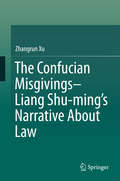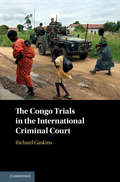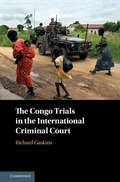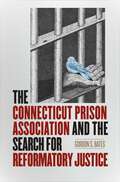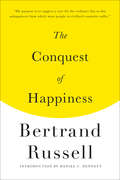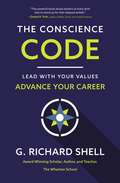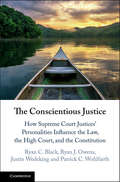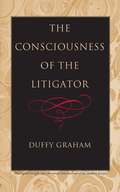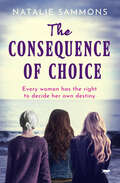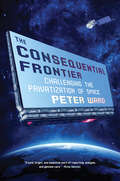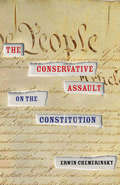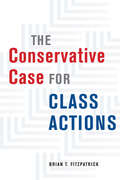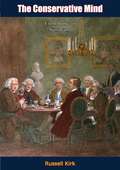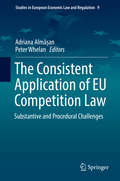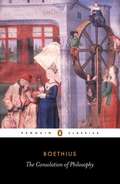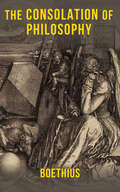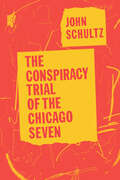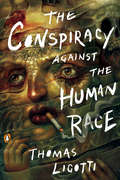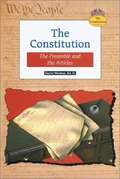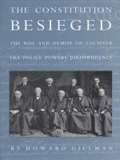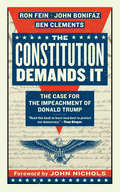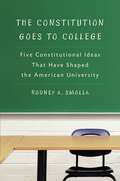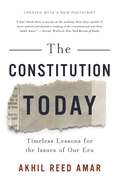- Table View
- List View
The Confucian Misgivings--Liang Shu-ming’s Narrative About Law
by Zhangrun XuThe major intellectual interest throughout this book is to offer a study on China's legal legacy, through Liang Shu-ming's eyes. The book follows the formula of the parallel between Life and Mind (人生与人心), Physis and Nomos, and compares Liang Shu-ming's narrative with his own practical orientation and with the theories of other interlocutors. The book puts Liang Shu-ming into the social context of modern Chinese history, in particular, the context of the unprecedented crisis of meaning in the legal realm and the collapse of a transcendental source for Chinese cultural identity in the light of modernity. The evaluation provided by this narrative could be helpful in clarifying the deep structures and significance of the present Chinese legal system through historically exploring Liang Shu-ming's misgivings. The book is intended for academics of legal, history and cultural studies. The book is unique in that it is the first book to explore New Confucian's considerations on reconstruction of Chinese legal system in the modern era. It presents a comprehensive systematical comparison of Liang Shu-ming's narrative about constitutional government in China against other schools of thought.
The Congo Trials in the International Criminal Court
by Richard GaskinsThis is the first in-depth study of the first three ICC trials: an engaging, accessible text meant for specialists and students, for legal advocates and a wide range of professionals concerned with diverse cultures, human rights, and restorative justice. It introduces international justice and courtroom trials in practical terms, offering a balanced view on persistent tensions and controversies. Separate chapters analyze the working realities of central African armed conflicts, finding reasons for their surprising resistance to ICC legal formulas. The book dissects the Court's structural dynamics, which were designed to steer an elusive middle course between high moral ideals and hard political realities. Detailed chapters provide vivid accounts of courtroom encounters with four Congolese suspects. The mixed record of convictions, acquittals, dissents, and appeals, resulting from these trials, provides a map of distinct fault-lines within the ICC legal code, and suggests a rocky path ahead for the Court's next ventures.
The Congo Trials in the International Criminal Court
by Richard GaskinsThis is the first in-depth study of the first three ICC trials: an engaging, accessible text meant for specialists and students, for legal advocates and a wide range of professionals concerned with diverse cultures, human rights, and restorative justice. Now with an updated postscript for the paperback edition, it offers a balanced view on persistent tensions and controversies. Separate chapters analyze the working realities of central African armed conflicts, finding reasons for their surprising resistance to ICC legal formulas. The book dissects the Court's structural dynamics, which were designed to steer an elusive middle course between high moral ideals and hard political realities. Detailed chapters provide vivid accounts of courtroom encounters with four Congolese suspects. The mixed record of convictions, acquittals, dissents, and appeals, resulting from these trials, provides a map of distinct fault-lines within the ICC legal code, and suggests a rocky path ahead for the Court's next ventures.
The Connected Self
by Heather WiddowsCurrently, the ethics infrastructure - from medical and scientific training to the scrutiny of ethics committees - focuses on trying to reform informed consent to do a job which it is simply not capable of doing. Consent, or choice, is not an effective ethical tool in public ethics and is particularly problematic in the governance of genetics. Heather Widdows suggests using alternative and additional ethical tools and argues that if individuals are to flourish it is necessary to recognise and respect communal and public goods as well as individual goods. To do this she suggests a two-step process - the 'ethical toolbox'. First the harms and goods of the particular situation are assessed and then appropriate practices are put in place to protect goods and prevent harms. This debate speaks to core concerns of contemporary public ethics and suggests a means to identify and prioritise public and common goods.
The Connecticut Prison Association and the Search for Reformatory Justice (The Driftless Connecticut Series)
by Gordon S. BatesHow a groundbreaking advocacy organization has helped shape Connecticut's criminal justice system since 1875 The Connecticut Prison Association and the Search for Reformatory Justice looks at the role the Connecticut Prison Association played in the formation of the state's criminal justice system. Now organized under the name Community Partners in Action (CPA), the Connecticut Prison Association was formed to ameliorate the conditions of criminal defendants and people in prison, improve the discipline and administration of local jails and state prisons, and furnish assistance and encouragement to people returning to their communities after incarceration. The organization took a leading role in prison reform in the state and was instrumental in a number of criminal justice innovations. Gordon S. Bates, former Connecticut Prison Association volunteer and executive director (1980 – 1998), offers a detailed history of this and similar voluntary associations and their role in fostering a rehabilitative, rather than a retributive, approach to criminal justice. First convened in 1875 as the Friends of Partners of Prisoners Society, then evolving into the Connecticut Prison Association and CPA, the organization has consistently advocated for a humane, rehabilitative approach to prisoner treatment.
The Conquest of Happiness
by Bertrand Russell Daniel C. Dennett"Should be read by every parent, teacher, minister, and Congressman in the land."--The Atlantic In The Conquest of Happiness, first published by Liveright in 1930, iconoclastic philosopher Bertrand Russell attempted to diagnose the myriad causes of unhappiness in modern life and chart a path out of the seemingly inescapable malaise so prevalent even in safe and prosperous Western societies. More than eighty years later, Russell's wisdom remains as true as it was on its initial release. Eschewing guilt-based morality, Russell lays out a rationalist prescription for living a happy life, including the importance of cultivating interests outside oneself and the dangers of passive pleasure. In this new edition, best-selling philosopher Daniel C. Dennett reintroduces Russell to a new generation, stating that Conquest is both "a fascinating time capsule" and "a prototype of the flood of self-help books that have more recently been published, few of them as well worth reading today as Russell's little book."
The Conscience Code: Lead with Your Values. Advance Your Career.
by G. Richard ShellThe essential guide to standing up for your values at work. Protect your integrity by committing to The Conscience Code.A fast-track colleague elbowing their way up the corporate ladder in your organization is faking their sales reports. Your entrepreneur boss asks you to lie to would-be investors. The team leader is a serial sexual harasser. What should you do? Nobody prepared you for this part of professional life. You face a gut-wrenching choice: &“go along to get along&” or risk your job by speaking up for what you know is right.At the Wharton School of Business, MBA students have shared all these stories, and many more, with award-winning Professor G. Richard Shell. They want to stay true to themselves but fear the consequences of speaking up—for their families, office relationships and, ultimately, their careers. They are not alone. Surveys show that more than 40% of employees report seeing ethical misconduct at work, and most fail to report it—killing office morale and allowing the wrong people to set the example.Shell created The Conscience Code to point to a better path: recognize that these conflicts are coming, learn to spot them, then follow a research-based, step-by-step approach for resolving them skillfully. By committing to the Code, you can replace regret with long-term career success as a leader of conscience.The Conscience Code:Solves a crucial problem faced by professionals everywhere: What should they do when they are asked to compromise their core values to achieve organizational goals?Teaches readers to recognize and overcome the five organizational forces that push people toward actions they later regret.Lays out a systematic, values-to-action process that people at all levels can follow to maintain their integrity while achieving true success in their lives and careers.Driven by dramatic, real-world examples from Shell&’s classroom, today&’s headlines, and classic cases of corporate wrongdoing, The Conscience Code shows how to create value-based workplaces where everyone can thrive.
The Conscientious Justice: How Supreme Court Justices' Personalities Influence the Law, the High Court, and the Constitution
by Ryan C. Black Ryan J. Owens Justin Wedeking Patrick C. WohlfarthUnited States Supreme Court justices make decisions that have a profound impact on American society. Empirical legal scholars have portrayed justices as either single-minded or strategic seekers of policy, and there is little room in these theories for things like law, reputation, or personality. This book offers a fresh perspective that will jar Supreme Court scholarship out of complacency. It argues that justices' personalities influence their behavior, which in turn influences legal development and the United States Constitution. This impressive group of authors exhaustively examine every part of the Court's decision-making process, and focus on the trait of conscientiousness and how it influences justices over nine different empirical contexts, from agenda setting to writing the Court's opinions. The Conscientious Justice is an important and comprehensive account of judging that restructures existing approaches to analyzing the High Court.
The Consciousness of the Litigator
by Duffy GrahamThe Consciousness of the Litigator investigates the role of the lawyer in modern American political and social life and in the judicial process, and plumbs lawyers' perceptions of themselves, their work, and, especially, their sense of right and wrong. In so doing, the book sheds light on the unique and little-examined subject of the moral mind of the litigator, whose work extends to all corners of society and whose primary expertise---making legal arguments---is the fundamental skill of all lawyers. The Consciousness of the Litigator stands with Michael Kelly's Lives of Lawyers as a must-read for the many law students, scholars, and practicing litigators who struggle to balance ethical questions with the dictates of their highly commercialized profession.
The Consequence of Choice
by Natalie SammonsIn a world where motherhood can be a crime, a woman risks everything to defy those in power . . . Ten years after the world took drastic action to rein in overpopulation, Elspeth suspects she is pregnant—illegally—after a brief, alcohol-fuelled fling with Nick. Even procuring a test to confirm it would be risky. As Elspeth tries desperately to keep her condition hidden from the authorities, a female detective becomes convinced something illicit is going on—and tries to resuscitate her own troubled career by pursuing this lawbreaker. But behind the scenes, two people are determined to come to Elspeth&’s aid. One is someone close to her who has a secret. The other is someone she would never have expected. Now, as danger closes in, how far will they go to keep Elspeth—and her unborn baby—safe?
The Consequential Frontier: Challenging the Privatization of Space
by Peter Ward"A lucid, bright and essential work of reporting, analysis and genuine care. Peter Ward has given us a new way to think about private endeavors in space. Superb."—Rivka Galchen, author of Little LaborsThis in-depth work of reportage dares to ask what’s at stake in privatizing outer spaceEarth is in trouble—so dramatically that we’re now scrambling to explore space for valuable resources and a home for permanent colonization. With the era of NASA’s dominance now behind us, the private sector is winning this new space race. But if humans and their private wealth have made such a mess of Earth, who can say we won’t do the same in space?In The Consequential Frontier, business and technology journalist Peter Ward is raising this vital question before it’s too late. Interviewing tech CEOs, inventors, scientists, lobbyists, politicians, and future civilian astronauts, Ward sheds light on a whole industry beyond headline-grabbing rocket billionaires like Bezos and Musk, and introduces the new generation of activists trying to keep it from rushing recklessly into the cosmos. With optimism for what humans might accomplish in space if we could leave our tendency toward deregulation, inequality, and environmental destruction behind, Ward shows just how much cooperation it will take to protect our universal resource and how beneficial it could be for all of us.
The Conservative Assault on the Constitution
by Erwin ChemerinskyOver the last few decades, the Supreme Court and the federal appellate courts have undergone a dramatic shift to the right, the result of a determined effort by right-wing lawmakers and presidents to reinterpret the Constitution by reshaping the judiciary. Conservative activist justices have narrowed the scope of the Constitution, denying its protections to millions of Americans, exactly as the lawmakers who appointed and confirmed these jurists intended. Basic long-standing principles of constitutional law have been overturned by the Rehnquist and Roberts courts. As distinguished law professor and constitutional expert Erwin Chemerinsky demonstrates in this invaluable book, these changes affect the lives of every American. As a result of political pressure from conservatives and a series of Supreme Court decisions, our public schools are increasingly separate and unequal, to the great disadvantage of poor and minority students. Right-wing politicians and justices are dismantling the wall separating church and state, allowing ever greater government support for religion. With the blessing of the Supreme Court, absurdly harsh sentences are being handed down to criminal defendants, such as life sentences for shoplifting and other petty offenses. Even in death penalty cases, defendants are being denied the right to competent counsel at trial, and as a result innocent people have been convicted and sentenced to death. Right-wing politicians complain that government is too big and intrusive while at the same time they are only too happy to insert the government into the most intimate aspects of the private lives of citizens when doing so conforms to conservative morality. Conservative activist judges say that the Constitution gives people an inherent right to own firearms but not to make their own medical decisions. In some states it is easier to buy an assault rifle than to obtain an abortion. Nowhere has the conservative assault on the Constitution been more visible or more successful than in redefining the role of the president. From Richard Nixon to George W. Bush, conservatives have sought to significantly increase presidential power. The result in recent years has been unprecedented abuses, including indefinite detentions, illegal surveillance, and torture of innocent people. Finally, access to the courts is being restricted by new rulings that deny legal protections to ordinary Americans. Fewer lawsuits alleging discrimination in employment are heard; fewer people are able to sue corporations or governments for injuries they have suffered; and even when these cases do go to trial, new restrictions limit damages that plaintiffs can collect. The first step in reclaiming the protections of the Constitution, says Chemerinsky, is to recognize that right-wing justices are imposing their personal prejudices, not making neutral decisions about the scope of the Constitution, as they claim, or following the "original meaning" of the Constitution. Only then do we stand a chance of reclaiming our constitutional liberties from a rigid ideological campaign that has transformed our courts and our laws. Only then can we return to a constitutional law that advances freedom and equality.
The Conservative Case for Class Actions
by Brian T. FitzpatrickSince the 1960s, the class action lawsuit has been a powerful tool for holding businesses accountable. Yet years of attacks by corporate America and unfavorable rulings by the Supreme Court have left its future uncertain. In this book, Brian T. Fitzpatrick makes the case for the importance of class action litigation from a surprising political perspective: an unabashedly conservative point of view. Conservatives have opposed class actions in recent years, but Fitzpatrick argues that they should see such litigation not as a danger to the economy, but as a form of private enforcement of the law. He starts from the premise that all of us, conservatives and libertarians included, believe that markets need at least some rules to thrive, from laws that enforce contracts to laws that prevent companies from committing fraud. He also reminds us that conservatives consider the private sector to be superior to the government in most areas. And the relatively little-discussed intersection of those two beliefs is where the benefits of class action lawsuits become clear: when corporations commit misdeeds, class action lawsuits enlist the private sector to intervene, resulting in a smaller role for the government, lower taxes, and, ultimately, more effective solutions. Offering a novel argument that will surprise partisans on all sides, The Conservative Case for Class Actions is sure to breathe new life into this long-running debate.
The Conservative Mind: From Burke to Santayana
by Russell Kirk"It is inconceivable even to imagine, let alone hope for, a dominant conservative movement in America without Kirk's labor." — William F. Buckley, Jr.Russell Kirk's The Conservative Mind is one of the greatest contributions to twentieth-century American conservatism. Brilliant in every respect, from its conception to its choice of significant figures representing the history of intellectual conservatism, The Conservative Mind launched the modern American Conservative Movement when it was first published in 1953 and has become an enduring classic of political thought.—Print ed.
The Consistent Application of EU Competition Law
by Peter Whelan Adriana AlmășanIn recent years, there has been a decentralisation of the enforcement of the EU competition law provisions, Articles 101 and 102 of the Treaty on the Functioning of the European Union. Consequently, the national application of these provisions has become increasingly more common across the European Union. This national application poses various challenges for those concerned about the consistent application of EU competition law. This edited collection provides an in-depth analysis of the most important limitations of, and the challenges concerning, the applicability of Articles 101 and 102 of the Treaty on the Functioning of the European Union (TFEU) at national level. Divided into five parts, the book starts out by examining how the consistent enforcement of Articles 101 and102 operates as a general EU competition policy. It then discusses several recent landmark cases of the European Court of Justice on Articles 101 and 102 TFEU, before proceeding to analyse certain additional, unique jurisdictional challenges to the uniform application of the EU competition law provisions. Subsequently, it focuses on one of the most important instruments that can help to achieve the uniform application of EU competition law in cases handled by the national courts: preliminary rulings. Finally, it provides selective examples of how Articles 101 and 102 TFEU are effectively applied at national level, thereby providing additional input into how problematic the issue of consistent application of EU competition law is in practice.
The Consolation of Philosophy
by Ancius BoethiusBoethius was an eminent public figure under the Gothic emperor Theodoric, and an exceptional Greek scholar. When he became involved in a conspiracy and was imprisoned in Pavia, it was to the Greek philosophers that he turned. THE CONSOLATION was written in the period leading up to his brutal execution. It is a dialogue of alternating prose and verse between the ailing prisoner and his 'nurse' Philosophy. Her instruction on the nature of fortune and happiness, good and evil, fate and free will, restore his health and bring him to enlightenment. THE CONSOLATION was extremely popular throughout medieval Europe and his ideas were influential on the thought of Chaucer and Dante.
The Consolation of Philosophy
by Anicius Manlius BoethiusIn this highly praised new translation of Boethius’s The Consolation of Philosophy, David R. Slavitt presents a graceful, accessible, and modern version for both longtime admirers of one of the great masterpieces of philosophical literature and those encountering it for the first time. Slavitt preserves the distinction between the alternating verse and prose sections in the Latin original, allowing us to appreciate the Menippian parallels between the discourses of literary and logical inquiry. His prose translations are lively and colloquial, conveying the argumentative, occasionally bantering tone of the original, while his verse translations restore the beauty and power of Boethius’s poetry. The result is a major contribution to the art of translation.Those less familiar with Consolation may remember it was written under a death sentence. Boethius (c. 480–524), an Imperial official under Theodoric, Ostrogoth ruler of Rome, found himself, in a time of political paranoia, denounced, arrested, and then executed two years later without a trial. Composed while its author was imprisoned, cut off from family and friends, it remains one of Western literature’s most eloquent meditations on the transitory nature of earthly belongings, and the superiority of things of the mind. In an artful combination of verse and prose, Slavitt captures the energy and passion of the original. And in an introduction intended for the general reader, Seth Lerer places Boethius’s life and achievement in context.
The Consolation of Philosophy
by BoethiusOften described as the last great work of Western classical antiquity, Boethius' Consolation of Philosophy grapples with many of the enduring questions in philosophy; the problem of evil, determinism vs. free-will and nature of virtue and justice, among others. Though a committed Christian, Boethius arrives at his conclusions by means of the natural philosophical methods of Classical Greece alone, being of the opinion that faith and reason must necessarily arrive at the same conclusions.
The Conspiracy Trial of the Chicago Seven
by John SchultzIn 1969, the Chicago Seven were charged with intent to "incite, organize, promote, and encourage" antiwar riots during the chaotic 1968 Democratic National Convention in Chicago. The defendants included major figures of the antiwar and racial justice movements: Abbie Hoffman and Jerry Rubin, the madcap founders of the Yippies; Tom Hayden and Rennie Davis, founders of Students for a Democratic Society and longtime antiwar organizers; David Dellinger, a pacifist and chair of the National Mobilization Committee to End the War in Vietnam; and Bobby Seale, co-founder of the Black Panther Party, who would be bound and gagged in the courtroom before his case was severed from the rest. The Conspiracy Trial of the Chicago Seven is an electrifying account of the months-long trial that commanded the attention of a divided nation. John Schultz, on assignment for The Evergreen Review, witnessed the whole trial of the Chicago Seven, from the jury selection to the aftermath of the verdict. In his vivid account, Schultz exposes the raw emotions, surreal testimony, and judicial prejudice that came to define one of the most significant legal events in American history. In October 2020, Aaron Sorkin's film, The Trial of the Chicago Seven, will bring this iconic trial to the screen.
The Conspiracy against the Human Race: A Contrivance of Horror
by Thomas LigottiIn Thomas Ligotti's first nonfiction outing, an examination of the meaning (or meaninglessness) of life through an insightful, unsparing argument that proves the greatest horrors are not the products of our imagination but instead are found in reality."There is a signature motif discernible in both works of philosophical pessimism and supernatural horror. It may be stated thus: Behind the scenes of life lurks something pernicious that makes a nightmare of our world."His fiction is known to be some of the most terrifying in the genre of supernatural horror, but Thomas Ligotti's first nonfiction book may be even scarier. Drawing on philosophy, literature, neuroscience, and other fields of study, Ligotti takes the penetrating lens of his imagination and turns it on his audience, causing them to grapple with the brutal reality that they are living a meaningless nightmare, and anyone who feels otherwise is simply acting out an optimistic fallacy. At once a guidebook to pessimistic thought and a relentless critique of humanity's employment of self-deception to cope with the pervasive suffering of their existence, The Conspiracy against the Human Race may just convince readers that there is more than a measure of truth in the despairing yet unexpectedly liberating negativity that is widely considered a hallmark of Ligotti's work.
The Constitution
by Daniel WeidnerExplores the preamble and individual articles of the United States Constitution, as well as how this important document was written, how it has developed through the years, and how it is enforced
The Constitution Besieged: The Rise & Demise of Lochner Era Police Powers Jurisprudence
by Howard GillmanThe Constitution Besieged offers a compelling reinterpretation of one of the most notorious periods in American constitutional history. In the decades following the Civil War, federal and state judges struck down as unconstitutional a great deal of innovative social and economic legislation. Scholars have traditionally viewed this as the work of a conservative judiciary more interested in promoting laissez-faire economics than in interpreting the Constitution. Gillman challenges this scholarly orthodoxy by showing how these judges were in fact observing a long-standing constitutional prohibition against "class legislation." Originally published in cloth by Duke University Press, this book received the 1994 C. Herman Pritchett Award for the "Best Book in the Field of Law and Courts," awarded by the Law and Courts Section of the American Political Science Association.
The Constitution Demands It: The Case for the Impeachment of Donald Trump
by John Nichols Ben Clements Ron Fein John Bonifaz"Read this book and learn how best to protect our democracy." --Tom Steyer, founder of NeedToImpeach.org The reasons Donald Trump must be impeached — as per the Founding Fathers — and what you can do to help make that happenThree veteran constitutional attorneys say there’s no way around it: The Constitution demands that Donald Trump must be impeached. And in clear language using compelling logic rooted firmly in the Constitution, they detail why the time to start is now—not in the indefinite future after criminal investigations have ended. In fact, much of Trump’s impeachable conduct lies outside the scope of ongoing federal criminal investigations. Citing charges such as accepting illegal payments from foreign governments, using government agencies to persecute political enemies, obstructing justice, abusing the pardon power, and the undermining freedom of the press, they provide the factual and legal basis for eight articles of impeachment. In short, they argue, abuses threatening our constitutional democracy should be dealt with by the remedy that the Constitution provides for a lawless, authoritarian president: impeachment. And an informed citizenry should be part of the process. After all, they say, impeachment is not a constitutional crisis — impeachment is the cure for a constitutional crisis.
The Constitution Goes to College: Five Constitutional Ideas That Have Shaped the American University
by Rodney A. SmollaAmerican college campuses, where ideas are freely exchanged, contested, and above all uncensored, are historical hotbeds of political and social turmoil. In the past decade alone, the media has carefully tracked the controversy surrounding the speech of Iranian President Mahmoud Ahmadinejad at Columbia, the massacres at Virginia Tech, the dismissal of Harvard’s President Lawrence Summers, and the lacrosse team rape case at Duke, among others. No matter what the event, the conflicts that arise on our campuses can be viewed in terms of constitutional principles, which either control or influence outcomes of these events. In turn, constitutional principles are frequently shaped and forged by campus culture, creating a symbiotic relationship in which constitutional values influence the nature of universities, which themselves influence the nature of our constitutional values.In The Constitution Goes to College, Rodney A. Smolla—a former dean and current university president who is an expert on the First Amendment—deftly uses the American university as a lens through which to view the Constitution in action. Drawing on landmark cases and conflicts played out on college campuses, Smolla demonstrates how five key constitutional ideas—the living Constitution, the division between public and private spheres, the distinction between rights and privileges, ordered liberty, and equality—are not only fiercely contested on college campuses, but also dominate the shape and identity of American university life.Ultimately, Smolla compellingly demonstrates that the American college community, like the Constitution, is orderly and hierarchical yet intellectually free and open, a microcosm where these constitutional dichotomies play out with heightened intensity.
The Constitution Today: Timeless Lessons for the Issues of Our Era
by Akhil Reed AmarA leading legal scholar addresses the most important constitutional controversies of the past two decades and illuminates the Constitution's spirit and ongoing relevanceWhen the stories that lead our daily news involve momentous constitutional questions, present-minded journalists and busy citizens cannot always see the stakes clearly. In The Constitution Today, Akhil Reed Amar, America's preeminent constitutional scholar, considers the biggest and most bitterly contested debates of the last two decades—from gun control to gay marriage, affirmative action to criminal procedure, presidential dynasties to Congressional dysfunction, Bill Clinton's impeachment to Obamacare. He shows how the Constitution's text, history, and structure are a crucial repository of collective wisdom, providing specific rules and grand themes relevant to every organ of the American body politic.Leading readers through the particular constitutional questions at stake in each episode while outlining his abiding views regarding the Constitution's letter, its spirit, and the direction constitutional law must go, Amar offers an essential guide for anyone seeking to understand America's Constitution and its relevance today.
